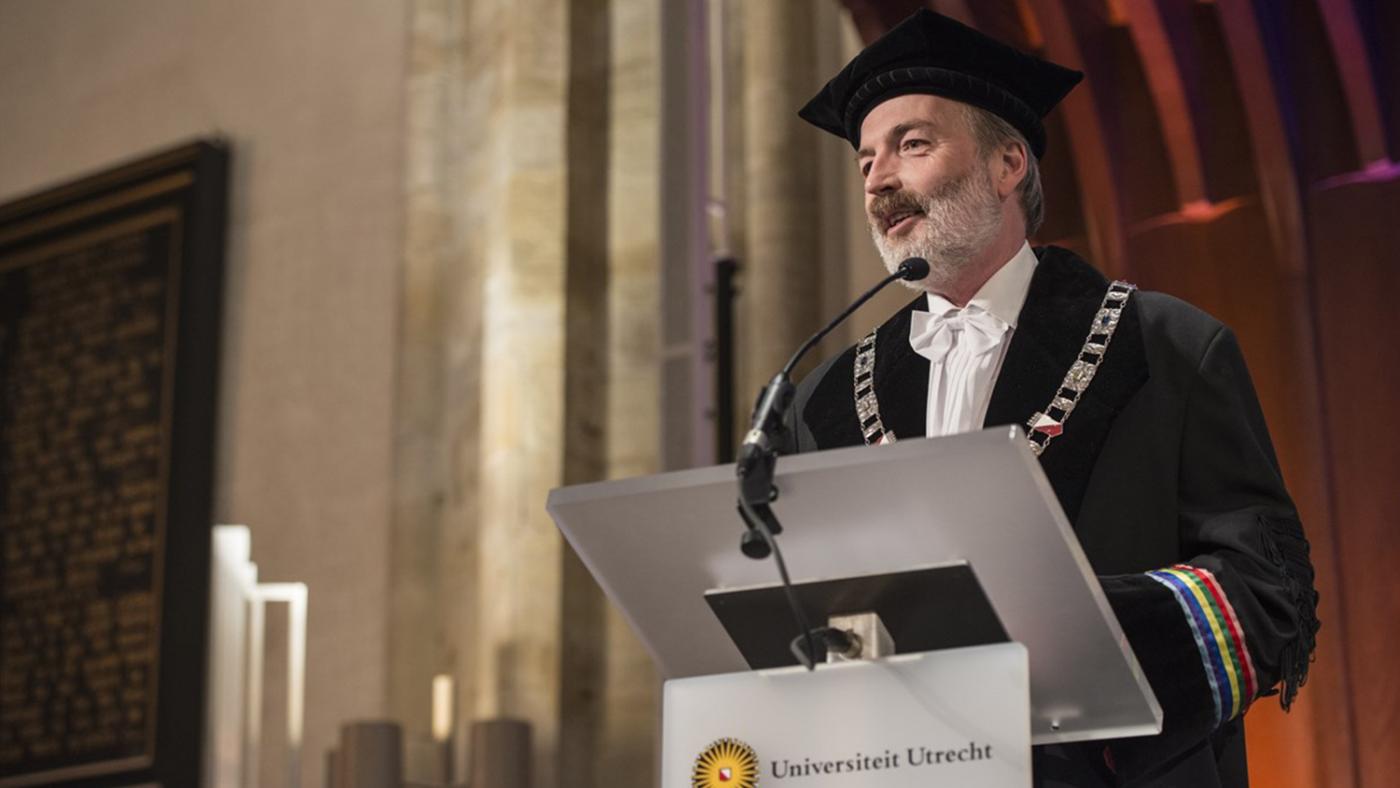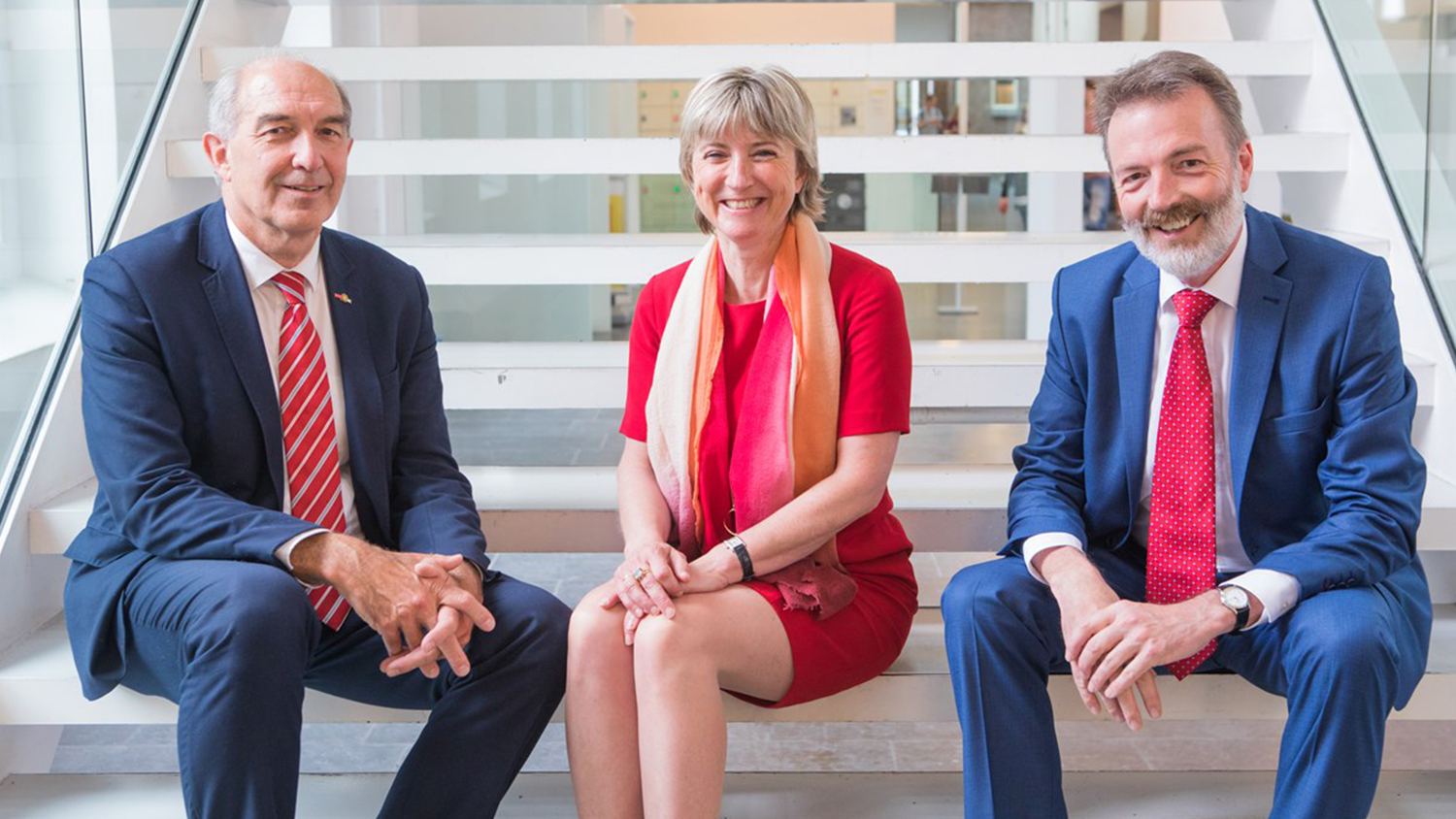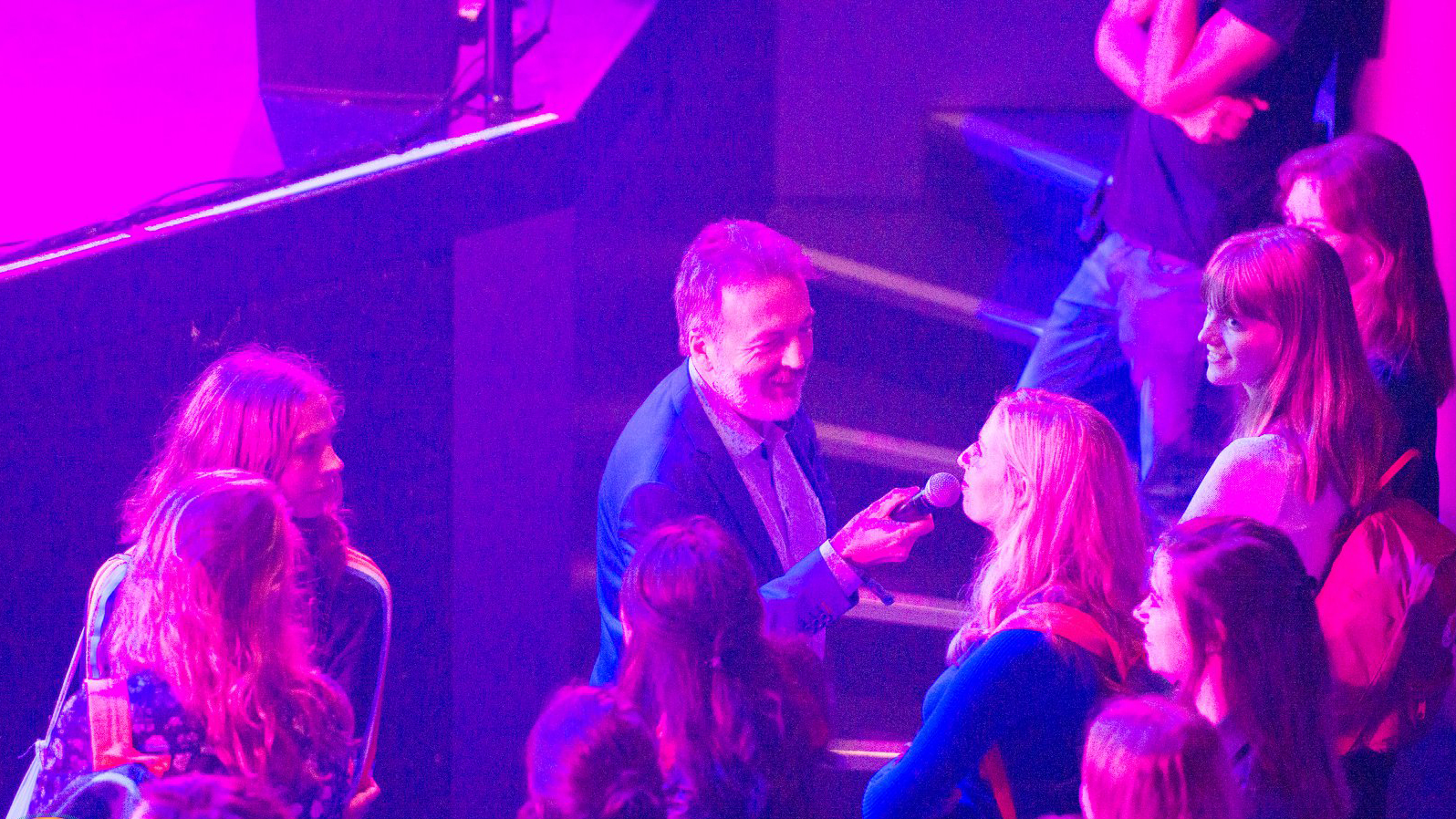Rector Henk Kummeling’s first 100 days

Day 4: getting to know the Administration Building
Henk Kummeling had often visited the Administration Building in De Uithof in his days as dean of the Faculty of Law, Economics and Governance. Still, the experience is quite different when the fifth floor of the building suddenly becomes your regular place of work. “You see people get startled when I walk in. They wonder if something’s wrong. Or people are surprised when we’re on an elevator and I address them, or shake their hands. It’s interesting to me to hear what people do, what inspires them, so I talk to them. If I have a few minutes to spare, I always go downstairs to talk to people in their natural habitats. I don’t just want to receive guests in my own room, and have to depend on all sorts of necessary appointments. I just want to go to people. I like to interact with people in an easy manner, and I hope it’s the same the other way around, that people feel it’s easy to get interact with me.”
This is not without reason. With a wink, he says: “As board members, we’re wise, of course, but we don’t know everything. It’s impossible as rector to build expertise in all disciplines. Whereas within the university, there are people with enormous expertise in certain areas. So it’s incredibly rewarding to work with these people, and to spar with them. They help us make sensible decisions that benefit the university. It’s lovely to have people like this around you. We’re so successful in Utrecht because we’re willing to work together.”
Day 5: first meeting Executive Board
“I was excited for my first meeting with the Executive Board,” Kummeling says. “Suddenly, it’s just the three of you. I knew President Anton Pijpers from when we were both deans, but I wasn’t as familiar with Annete Ottow (who had been his successor at the Faculty of Law). The question is whether we could find a way to work together that makes you think: this is going to be fun. From the first moment, I felt as though this was a club that could truly work together. We’re completely different people, but we know how to find each other.”
The board consists of three former UU deans, but Kummeling doesn’t think that’s an issue. “They’re all people familiar with the world beyond the UU. Anton Pijpers worked in business, Annetje Ottow was a lawyer, and I’m familiar with the world of public administration. So we all have our ways of approaching the UU from the outside. In the end, of course, we need to ensure we’re always thinking about whether what we’re doing checks out with the outside world, as well. But the university is a special world of its own. We’ve had situations where ‘people from the outside’ failed as a direct consequence of the special character the university has, with its hordes of incredibly stubborn, enormously gifted people. That’s something you need to be able to deal with.”
 Photo: Arnaud Mooij, UU
Photo: Arnaud Mooij, UU
Day 11: First meeting with co-determination
“Mister Kummeling, we’ve agreed with Bert...” someone says during the meeting of the committee Education, Research and Students. It’s not surprising the co-determination members of the University Council address the new rector politely in their first meeting with him, but Kummeling would prefer it differently, he tells the students with a laugh. If the previous rector was addressed as ‘Bert’, he didn’t want to be ‘mister Kummeling’.
“The huge value the University Council has, is that they hold up a mirror for us, the Executive Board,” Kummeling says. As professor of State Law, it’s obvious to him how important co-determination is. “They can ask: ‘Do you know what you’re doing?’. Although we try our best as board, we won’t always have a complete overview of who our decisions effect, and how. It’s incredibly rewarding to me to hear the ideas, thoughts, and criticisms of the University Council members.”
That’s not to say all ideas are instantly accepted. Kummeling: “The discussion about resits, for instance. Students want more options for resits, but there’s enough research that shows more resits actually leads to lower grades. People will see exams as optional, and the quality of education deteriorates, as people come to class ill-prepared. I want to make that clear. On the other hand, students do offer suggestions that make sense. The previous academic year, we came to the conclusion that students’ wishes to have a physical student card had a point. So, during my first meeting, I said we’d accommodate them, and I saw how that startled some of them. I guess they weren’t expecting it.”
“During the start of the academic year, I told the new crew that we needed to remember we have the same goal, which is making sure the Utrecht University community does well. There are people who believe in the type of politics that highlights differences, but it doesn’t do us any good when parties are pit against each other. If you look at the United States, for example, you see how the Democrats and Republicans are constantly begrudging the other their successes. If one party proposes something, the other will say it’s worthless by default. There’s no commonality at all anymore, and that won’t get you anywhere. Of course, there’s room for some fierce debates. Excitement is important, and often shows where people’s interests are, and how they relate to each other, but it’s unhealthy when you start saying: ‘We don’t want the University Council to be able to say they’ve won’. Or the other way around. For me, compromise and consensus aren’t dirty words.”
Day 22: first meeting with deans
For six years, Kummeling was dean of the Faculty of Law, Economics and Governance. In that position, he was often present at meetings between deans and the Executive Board. Now, as of June 1st, he’s in the same meetings, at the other side of the table. “As a rector, you’re more of a connecting factor. An important factor of why the UU is so successful, is that the deans and the Executive Board can easily find each other. During those meetings, there’s talk of classic questions, such as how the board can ensure the deans can and will offer as much input as possible. Or how we make sure that if we create a plan, it actually gets implemented.”
“Together with the deans, we’ve decided that education is important, and that you can also further your UU career in education. We assume the equality of education and research. That not everyone shares this feeling, is something we must work on. Because if research accomplishments in science remain the dominant factor when reviewing whether someone can advance their career, we’ll come up against a wall, I think. I’m a proponent of top researchers spending time in class as well. A few years ago, we awarded Michael Sandel an honorary doctorate. We’d wanted to do so a year before, but he’d said he couldn’t make it, as he had to teach a class the next day. And no way that he’d skip out on education. I think we should come to think of that as obvious, too.”
“We’ve made agreements with the deans about the distribution of money for research purposes. Starting point is that all research is equal. In the past, the idea prevailed that the Science research was of greater importance than Humanities research. But all science matters in social issues. You won’t get any CO2 in the ground near Barendrecht if you’ve only got Science people involved; things will inevitably fail. And the other way around holds true as well: in many disciplines, we need the skills of the Sciences.”

Photo: Facebookpagina UIT
Day 74: Utrecht Introduction Time (UIT)
TivoliVredenburg is filled with first-year students. After a breakdance act and a video message from the mayor, Henk Kummeling takes the stage with Tineke Zweed (HU). Or, well, Kummeling races between stage and audience with a microphone. How tall is the Dom Tower? He asks the UIT participants. And how many students are there in Utrecht anyway? Quizmaster Kummeling gives a girl a goodie bag after five questions, because “she had really looked into Utrecht”.
“We weren’t there with a message to present,” Kummeling reflects. “We don’t like holding moralistic speeches. It’s not going to help anyone if on Monday morning 9 am, there’s a guy with a beard telling you ‘boys and girls, go do your best’. It’s absolute nonsense to stand on a stage like that and say: ‘Look around, half of you won’t be around in a little while.’ That discourages people, whereas you should really support their enthusiasm.”
That doesn’t mean the university isn’t involved in the introduction week, Kummeling says. “We don’t want students to think from day one that studying is just drinking a case of beer a week. That it’s only fun if there’s binge drinking and kilos of drugs. Of course people also come here to discover themselves. That’s the beauty of college. The introduction aims to let students have a good start, both in their studies and in Utrecht.”
One question in this is where the university’s responsibility ends and your own begins. And whether an educational institution should be involved in what students do with their time off. And if so, whether you should spend public resources on this, for instance by subsidizing associations’ boards. It’s a question that rears its head regularly, especially after incidents. “Tough questions,” the rector thinks. “A student does more than just sit in class. And in order to feel at home in Utrecht, students need social lives. People who feel good about themselves, also feel better about themselves in class. So as a university, it is important that there are student associations that provide a means of socialising. We certainly wouldn’t benefit from an austere student life.”
“The board subsidies are, in a way, a targeting mechanism. Soon, the three-year distribution of subsidies among separate associations will be discussed in the University Council again. This point will certainly be cause for discussion and attention...”
Day 95: Start academic year
Junior researcher Elizabeth Dirth is on stage, teary-eyed, in a packed Dom Church, while Henk Kummeling tells the audience about her contributions to science and society. As rector magnificus, he gets to bring a few students’ achievements into the limelight, as he gives out the Student Awards.
“For me, handing out the prizes for best master’s thesis and exceptional extracurricular activities were the highlights of the ceremony,” Kummeling says. “It’s so much fun to do. It’s amazing to see those students sit there, beaming with pride yet nervous about the results. I personally feel – with all due respect to all the speeches held – that’s the true start of the academic year.”
The speeches that were held focused on workload. Many employees and students in the Dom Church wore a small, red square on their outfits, symbolising their discontent. Although Kummeling wore the red square himself during the drinks, it wasn’t on his toga during the ceremony. “It was a conscious decision. As rector, I don’t think I should be a walking advertisement for all sorts of messages. So even though I support the protests, there’s a great risk that if I’m on stage wearing a red square, I’ll be seen as the poster boy of the movement. But I’m rector for everyone.”
“For me, the red square is a call to the government, to ensure we receive the means necessary to provide students with the quality that we want to provide. The workload issue is derived from that. We have to service more students than we receive funds for. That means we’re exhausting the willingness, ambitions, interests, and enthusiasm of our researchers. They work nights and weekends because they don’t want to teach low-quality classes or present a messy article, but they don’t actually have the proper time for it. To me, that’s the core of these protests.”
“Offering good education for future generation is a crucial task the government has to fulfil. It’s not just academic education, but primary education too, for example. The efficiency cutbacks that were unleashed on primary and secondary education is a thorn in the flesh. This is about the future. Our education is the basis for the development of our society. Where do you get off skimping on that?”
Henk Kummeling (1961) studied Law in Nijmegen and subsequently did his PhD there in 1988. After his promotion, he became assistant professor of State and Administrative Law at Utrecht University. In 1995, he became professor of Administrative Law and Comparative State Law in Utrecht. From 2006 to 2014, he was chairman of the Electoral Council, an advisory body of government and parliament. On April 25, 2014, he was knighted Officer in the Order of Orange-Nassau as his ‘services to society were of special value’. After his time as dean of the Faculty of Law, Economics and Governance (2008-2014), he became visiting professor at the University of the Western Cape in Cape Town, South Africa. In 2015, the UU named him distinguished professor. On June 1, 2018, he succeeded Bert van der Zwaan as rector magnificus of Utrecht University.